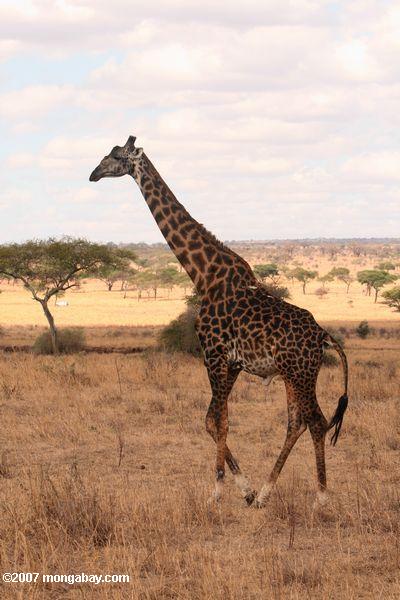To read more about Tanzania’s recent announcement related to the Serengeti road: Unpaved road through Serengeti to progress.
The controversial Serengeti road is going ahead, but with conditions. According to the Tanzanian Minister for Natural Resources and Tourism, Ezekiel Maige, the road will not be paved and it will be run by the Tanzanian park authority who will have the power to monitor traffic to ‘ensure no harm comes to the wildlife population’. Critics argue that even an unpaved road would eventually cripple the largest land migration in the world. However, famed Kenyan conservationist, ex-politician, and anthropologist, Richard Leakey, told mongabay.com that critics of the road are focusing on the wrong fight while failing to respect Tanzania’s right to develop. Leakey says that instead of attempting to stop the road from being built, which he believes is inevitable, critics should instead focus on funding a truly wildlife-friendly road.
“I am not celebrating the ministers statement because I really think we missed an opportunity to be creative and come up with a road that serves the wildlife migration and development needs of this part of Tanzania,” Leakey says, adding that “It could have been a showcase for the rest of Africa and the world.”
Leakey has long argued that the road proposal doesn’t have to be about either conservation or development, but must include both. A true Renaissance man, in conservation circles Leakey is known for his bold, incorruptible leadership as the first director of the Kenyan Wildlife Service (KWS) and currently as the chair of WildlifeDirect, an innovative NGO that helps raise money for underfunded and under-the-radar conservation projects.
 Lions in Tanzania will be impacted by a decline in prey if the Serengeti road hurts the migration. Photo by: Rhett A. Butler. |
Last year in an interview with WildlifeDirect Leakey proposed elevating the Serengeti road so the migration could continue beneath, while commercial and public traffic roared above.
“Should we not be thinking of whether they couldn’t elevate the road, as it crosses the Serengeti, put it up on stilts so that the animals could move freely below it? This would be very expensive but not impossible,” he said in the interview.
As planned the Serengeti road would bisect the northern portion of the park for 30 miles (50 kilometers). An elevated highway expanding that distance is not unknown: the six-lane Bang Na Expressway in Bangkok rises above the city for 33 miles (54 kilometers). One would imagine an elevated Serengeti road would need to rise high enough to allow elephants and giraffe to pass easily beneath. Despite the obvious merits of the idea, it has not appeared to make much notice yet amid the Tanzanian government or those fighting the road.
The on-the-ground road through Serengeti National Park has created no end of political headaches for the Tanzanian government. A scientific study found that direct impacts from the road would cut the wildebeest herd down by over one-third (over half a million animals) with indirect impacts, such as poaching, fences, and new development, exacerbating the situation. A leaked government study largely agreed: stating the road would ‘limit’ one of the world’s last intact migrations while hurting big predator populations who prey on the migrating herbivores. Such concerns brought the UN, the US government, the German government, and a wide array of NGOs and scientists together in condemning Tanzania’s plans.
Leakey agrees the road would be a ‘disaster’ for wildlife, but says that won’t stop Tanzania: “given the development needs of this part of Tanzania, it will only take time. This road will be eventually be built.”
Although he sides with critics about the impact of the road, he says the international community has ignored Tanzania’s rights.
“I have personally been very troubled by the way in which international pressure was used to influence a sovereign decision of Tanzania. We must not forget that Tanzania, like Kenya and many other countries in Africa, aspires to become an industrial nation and to do this they must seek the most economical way of growing their economy,” he said.
According to Leakey opponents have forgotten that the road’s purpose “was to develop two struggling isolated towns of Musoma and Mwanza on the western shores of Lake Victoria. These two towns are slated to become major cities as they are key to the expansion of trade between Tanzania and Kenya, Uganda, Rwanda, and Congo. The loss of the wildebeest migration and associated tourism benefits is a good reason to halt the road, but does it outweigh the economic imperative to diversify Tanzanian industry?”
International critics do not understand the plight of Tanzanians, says Leakey.
 Giraffe in Tanzania. Photo by: Rhett A. Butler. |
“I think that the people who have most vociferously opposed the road without consideration of the needs of Tanzania have been quite selfish. They have hardly enlisted a following of Tanzanian citizens. Why? If they want to know what Tanzanians think, feel and experience, then these ‘conservationists’ should move to Mwanza and Musom and run their businesses from there. It will give them a full understanding of the challenges of those peoples who struggle to make a living there. Only when we can step into the shoes of the people that our conservation actions affect, will we ‘conservationists’ genuinely be able to look for and find appropriate solutions for people, development and nature.”
The World Bank has proposed to fund a southern route from the coast to Lake Victoria, which would bypass the entirety of Serengeti National Park and connect Musoma and Mwanza, but would be a considerably longer route. In addition, the German government has offered to build local roads for communities in the northern Serengeti who are currently almost entirely cut-off. Currently the Tanzanian government is mulling the southern route, but Leakey believes that won’t take the pressure off demands for a northern route bisecting the park.
As a Kenyan, Leakey has a direct stake in Tanzania’s plan for a road through the Serengeti. The Serengeti ecosystems expands north from Tanzania into Kenya, where it is protected by Masai Mara National Park. Wildebeest and other herbivores making their way north, end up on the Kenyan plains for a time every year. The Masai Mara park is a hugely popular tourist spot, and any decline to wildlife in Tanzania’s Serengeti National Park would have knock-off effects on the Masai Mara. Despite having much to lose if the Serengeti migration collapses, the Kenyan government has been silent on the issue.
“People in glass houses don’t throw stones for a good reason. This proposed road would hugely impact on Kenya, but our government is understandably unable to criticize her sister, Tanzania,” says Leakey, who reserves his harshest criticism for the Kenyan government.
“Scientists have for decades been revealing the impact of unsustainable developments on the Masai Mara, the over grazing of livestock in the park, and the mushrooming of polluting hotels and lodges, the destruction of the watershed of the Mara River, removal of dead wood for camp fires, and the use of pesticides in flower farms in the area. It is widely known that many Kenyan government officials are involved in or benefiting from these practices. It is another demonstration of short term greed,” Leakey says. “Our leaders therefore they have no moral authority to say anything about threats from Tanzania. Attempts to develop a sensible zoning plan for the Mara and its environs have failed due to political interference by individuals with vested interests. Before Kenyan officials can ask Tanzania to halt development plans in the Serengeti to protect the Mara, they need to address the domestic policies and practices that have led to the wholesale destruction of the Masai Mara. Were it not for the protection that Tanzania has afforded to the Serengeti, we would probably be seeing the complete collapse of the Masai Mara given the damage that we have already caused.”
A 2009 study in the British Journal of Zoology found drastic declines of big herbivores in the Masai Mara. From 1989 to 2003 giraffes dropped an astounding 95 percent; warthog populations fell 80 percent; while hartebeest and impala dropped 76 percent and 67 percent respectively. Six of seven species studied had declined.
The entire Serengeti ecosystem is facing a barrage of threats according to Leakey: massive population growth on the fringes of the parks, poaching for bushmeat and the illegal wildlife trade, human-wildlife conflict, land use change, and widespread poverty.
In order to truly save the Serengeti, Leakey argues that the international community needs to really step up: not with criticism, but with funds.
“We are in total denial if we think that the costs of protecting such a large and important area can be achieved through tourism dollars alone. It can’t. If we can’t secure international funds to protect the Serengeti, a world heritage site of significant global value, then we will not only lose the Serengeti, but most other African protected areas. I can completely understand the average Tanzanian anger at the insensitivity of many that that the Tanzanian poor are paying the price and bearing the burden of preserving the Serengeti so that international tourists can come and see the wildlife spectacle. Most Tanzanians have never been to the Serengeti,” he says.
While critics would like to see the Tanzanian government abandon road plans in the Serengeti altogether, the government has been tenacious in insisting the road will go ahead. Once built, few doubt the road will eventually interrupt the migration. Could Leakey’s idea of an elevated road satisfy both sides?
“Of course we can build a wildebeest-migration-friendly road across the Serengeti,” Leaking insists. “It will just cost more.”
With that Leakey throws down the gauntlet for all stakeholders: what is the Serengeti worth?
Related articles
How do tourists view the Serengeti?
(06/27/2011) Serengeti National Park in Tanzania, an immense expanse of East African savanna, is a world famous tourist destination because of its plentiful megafauna, particularly the great migrating herds of wildebeest. Yet despite huge visitor numbers and the annual revenue of millions of US dollars, local poverty and increasing population continue to imperil the reserve. A new study in mongabay.com’s open-access journal Tropical Conservation Science found that while tourists to the Serengeti overall report a high degree of satisfaction with their trip, they are concerned about the future of the ecosystem.

(06/23/2011) In what is a victory for environmentalists, scientists, tourism, and the largest land migration on Earth, the Tanzanian government has cancelled a commercial road that would have cut through the northern portion of the Serengeti National Park. According to scientists the road would have severed the migration route of 1.5 million wildebeest and a half million other antelope and zebra, in turn impacting the entire ecosystem of the Serengeti plains.

(04/14/2011) What’s happening in Tanzania? This is a question making the rounds in conservation and environmental circles. Why is a nation that has so much invested in its wild lands and wild animals willing to pursue projects that appear destined not only to wreak havoc on the East African nation’s world-famous wildlife and ecosystems, but to cripple its economically-important tourism industry? The most well known example is the proposed road bisecting Serengeti National Park, which scientists, conservationists, the UN, and foreign governments alike have condemned. But there are other concerns among conservationists, including the fast-tracking of soda ash mining in East Africa’s most important breeding ground for millions of lesser flamingo, and the recent announcement to nullify an application for UNESCO Heritage Status for a portion of Tanzania’s Eastern Arc Mountains, a threatened forest rich in species found no-where else. According to President Jakaya Kikwete, Tanzania is simply trying to provide for its poorest citizens (such as communities near the Serengeti and the Eastern Arc Mountains) while pursuing western-style industrial development.
Serengeti road project opposed by ‘powerful’ tour company lobby
(03/16/2011) Government plans to build a road through Serengeti National Park came up against more opposition this week as the Tanzanian Association of Tour Operators (Tato) came out against the project, reports The Citizen. Tato, described as powerful local lobby group by the Tanzanian media, stated that the road would hurt tourism and urged the government to select a proposed alternative route that would by-pass the park. Tato’s opposition may signal a shift to more local criticism of the road as opposition against the project has come mostly from international environmentalists, scientists, and governments.
First International Serengeti Day hopes to halt road project

(02/23/2011) On March 19th the conservation organization, Serengeti Watch, is planning the world’s first International Serengeti Day to celebrate one of the world’s most treasured wildlife ecosystems. But the day also has another goal: bring attention to a Tanzanian government plan to build a road that would essentially cut the ecosystem, threatening the world’s largest mammal migration. “The proposed road will be a major commercial route that cuts across a narrow stretch of the Park near the border with Kenya. It goes through a wilderness zone critical to the annual migration of 1.3 million wildebeest and 0.7 million zebras, antelope, and other wildlife. This will involve extracting a strip of land from the Park itself, resulting in both the fragmentation of the ecosystem and the removal of the Serengeti National Park from the list of UN World Heritage Sites,” said David Blanton, co-founder of Serengeti Watch, in an interview with mongabay.com.
Leaked government study: road will damage Serengeti wildlife, despite president’s assurances
(02/10/2011) Tanzania’s President, Jakaya Kikwete, today gave promises that his proposed road project, which will bisect the Serengeti plains, would not hurt one of the world’s most famed parks and one of its last great land migrations. “The Serengeti is a jewel of our nation as well as for the international community. […] We will do nothing to hurt the Serengeti and we would like the international community to know this,” Kikwete said in a statement reported by the AFP. However, a government environment impact study, leaked to the conservation organization Serengeti Watch, paints a very different picture of how the road will damage the Serengeti. The report includes warnings that the road will ‘limit’ the migration of the plains’ 1.5 million wildebeest and 500,000 other herbivores including zebra.
Scientists: road through Serengeti would likely end wildebeest migration
(02/02/2011) A new study finds that a proposed road cutting through Serengeti National Park would likely have devastating consequences for one of the world’s last great migrations. According to the study the road itself could lead to a 35% loss in the famed park’s migrating wildebeest herd, essentially cutting the herd down by over half a million animals. Despite such concerns, and the availability of an alternative route that would bypass the Serengeti plains altogether, the Tanzanian government has stated it is going ahead with the controversial road.
World Bank offers to save Serengeti from bisecting road
(01/31/2011) The World Bank has offered to help fund an alternative route for a planned road project that would otherwise cut through Tanzania’s world famous Serengeti National Park, according to the German-based NGO Nature and Biodiversity Conservation Union (NABU). When announced last year, the road project raised protests from environmentalists, scientists, and Tanzanian tour companies, but the Tanzanian government refused to shift plans to an alternative southern route for the road, thereby bypassing the park.